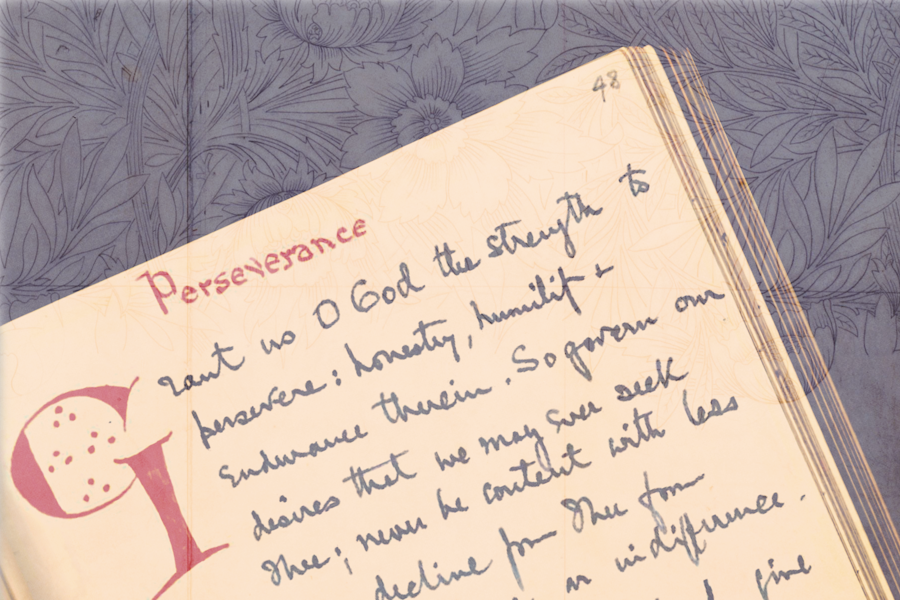It was in the late afternoon as the shadows lengthened, that I discovered Evelyn Underhill’s book of prayers at “The House of Retreat” at Pleshey (north of London) in April 2016. The leather-bound volume had bronze Celtic clasps that I thought were locked, but no, I could open it. And there I saw stunning red calligraphy headings and a collection of prayers. I quickly recognized the handwriting and knew I was holding Evelyn Underhill’s book of prayers! Scholars had lamented it had been lost many decades earlier. The volume was accompanied by a note from a Canadian-born priest who described the prayer book as “full of… good things on the mystery we are all caught up in.” He had found this volume at a London Oxfam store many years earlier and had used it for his personal prayers, before posting it to Pleshey in 2004. Apparently, it had been carefully placed in a suitcase for safekeeping, where it lay forgotten.
As I began copying out the prayers, I experienced a vision of around nine women in old-fashioned clothes in an arc above me. They were looking down at me – clapping, laughing and smiling, then looking at each other – nodding, laughing, clapping, then looking down at me again. And it came upon me suddenly – “the Cloud of Witnesses”! Then I vividly recall looking down, then gazing across the room, murmuring out aloud, “but I’m just little”.
The effect of the vision was a profound sense of being very small. As Evelyn writes, “our glimpse of Eternity humbles us…”1
I copied out the Prayer Book, then returned to Pleshey six weeks later to check my draft with the original. To my utter amazement, another volume of Evelyn’s prayers had been uncovered, with the same red calligraphy prayers. I copied out that volume, combined both volumes into one, deleted the repetitions, modernized the language and it was published as Evelyn Underhill’s Prayer Book in 2018. It has since been reprinted and a Korean translation has also been published.
So who was Evelyn Underhill (1875−1941)? Evelyn was a British writer in Christian spirituality, producing 39 books and hundreds of articles. She was incredibly gifted — the first woman to lecture in theology at Oxford University, made a Fellow of Kings College London, and was given an honorary doctorate from the University of Aberdeen. Early on, Evelyn wrote about mystics and mysticism, but after she encountered Christ in the early 1920s, she started writing about “the spiritual life” and her writings became deeply Christocentric. Lord Ramsey, former Archbishop of Canterbury, argues that Evelyn was one of the few in the Anglican Church in England in the 1920s and 30s who grasped the priority of prayer in the Christian life and the “place of the contemplative element within it.”2
Evelyn’s retreat-leading during these years was truly groundbreaking. She even led male Anglican priests on retreat as early as 1925. Evelyn’s book of prayers accompanied every retreat she led. It includes prayers from some of the great lovers of God from the 4th to 20th centuries, from all branches of the Christian Church. The prayers in Evelyn’s prayer books were collected for leading retreatants into corporate worship. Quotes from ancient liturgies are also included. These ancient voices enabled Evelyn to remind us that we are part of the historic Church, not just the 21st-century Christian family we can see and touch. Evelyn believed that one way to know God is to spend time in company with his friends, and that includes those who have gone before us. In fact, she argued that our religious experience can be thin and impoverished if cut off from our extensive liturgical history and the gifts of historical prayer warriors, whose prayers are not just educative, but can deeply enrich our spiritual formation.
Charles Williams tells us that Evelyn collected the prayers from her wide reading and that each prayer was “on probation” as she prayed the prayer, to see if it was worthy of inclusion in her collection.3 As well as providing prayers from deeply prayerful people from the past, Evelyn’s own passionate, heartfelt prayers are also included. For example:
Let our lives run to Your embrace… and breathe the breath of Eternity. O God Supreme! Most secret and most present, most beautiful and strong. Constant yet Incomprehensible, changeless yet changing all! What can I say, my God, my Life, my Holy Joy… You are the only reality…
Evelyn’s poetic language is evident in several prayers. For example, “beyond us are the hills of God, the snowfields of the Spirit, the Other Kingdom.” Also, Evelyn included the prayers of poets such as John Donne and Christina Rossetti, plus theologians and clerics who wrote poetry, such as Jeremy Taylor and John Scotus Eriugena.
Given Evelyn viewed adoration of God as central to our lives of prayer (rather than what she called “supernatural shopping lists!”), prayers of adoration of God “from the deeps of our being” are plentiful. For example, “pour Your holy light into our souls that we may ever adore You by whose love we were created”. Her emphasis is God, not self, thus she prays, “Help us to forget ourselves and live only for Your glory… adoring You.”
Evelyn also includes many prayers about spiritual formation. For example, “remake us”; “refashion our souls”; and “Let us ask God to work in us those changes that He knows we need”. Another reads:
“Jesus! the Master Carpenter… wield well Your tools in our souls these workshops that we, who come roughhewn, may be fashioned to a truer beauty by Your hand.”
Evelyn invites God to take initiative in our lives as we open to His Presence:
The house of our soul is narrow. O enlarge it, that You may enter in!
Breathe into our souls holy and heavenly desires and make us like our Saviour.
Govern our desires that we may ever seek You; never be content with less than You.
Evelyn also includes prayers of surrender: “Let us ask for such new light as our souls can bear.” Similarly, “If you will that we be in light, be blessed; if You will that we be in darkness, be blessed”. And Evelyn includes several short, pithy prayers: “Make us ready for adventure;” “Take from us all softness;” “Guide us with your adorable wisdom;” “Within Your wounds, hide me!”
Given the current fragility across the globe with the war in Ukraine, the ongoing pandemic, and our climate emergency, several of Evelyn’s prayers written during World War II are particularly pertinent today, nearly a century on. For example:
Soothe our restlessness: say to our hearts ‘Peace be still.’ Brood over us, within us, Spirit of perfect peace… enfolded in Your loving care.
[We] ask for the deep Peace of God… in spite of all surface turmoil.
Watch, dear Lord, those who wake or watch or weep tonight.
These two prayers particularly resonate with me at this time:
Grant us, almighty God, Your peace that passes understanding, that we, amid the sorrows of life, may rest in You, knowing that all things are in You, under Your care, governed by Your will and guarded by Your love, so that with a quiet heart, we may face the clouds and the darkness, ever rejoicing that darkness and light are both alike to You, through Jesus Christ our Lord.
Merciful Father… we remember before You all Your children in every part of the world who are burdened and oppressed: those whose hopes have been crushed: those whose purposes have been overthrown… Help them to rest in You and fully pacify and quieten their souls in You… we commend unto You all those about to depart this life, asking You to grant unto them the spirit of love and tranquillity and trustfulness.
The diversity of prayers in the volume is particularly striking. In this collection we are ushered in to join with the prayers of women and men of God through the centuries, that “some measure of the Spirit they received… may fall on us”.
Evelyn invites us into a spiritual journey that is expectant and daring. She viewed soft coziness as the enemy of Christianity, so it is no surprise that she prays, “the path of love may lead to the Cross… May we take up our Cross and follow Christ.” And Evelyn believed “Come” is the keyword of our spiritual lives: Come Holy Spirit! Come Lord Jesus! So alongside Underhill, we who are thirsty say, “Come!”
Photo from Evelyn Underhill’s Prayer Book, used with permission.
Text First Published April 2022 · Last Featured on Renovare.org April 2022


